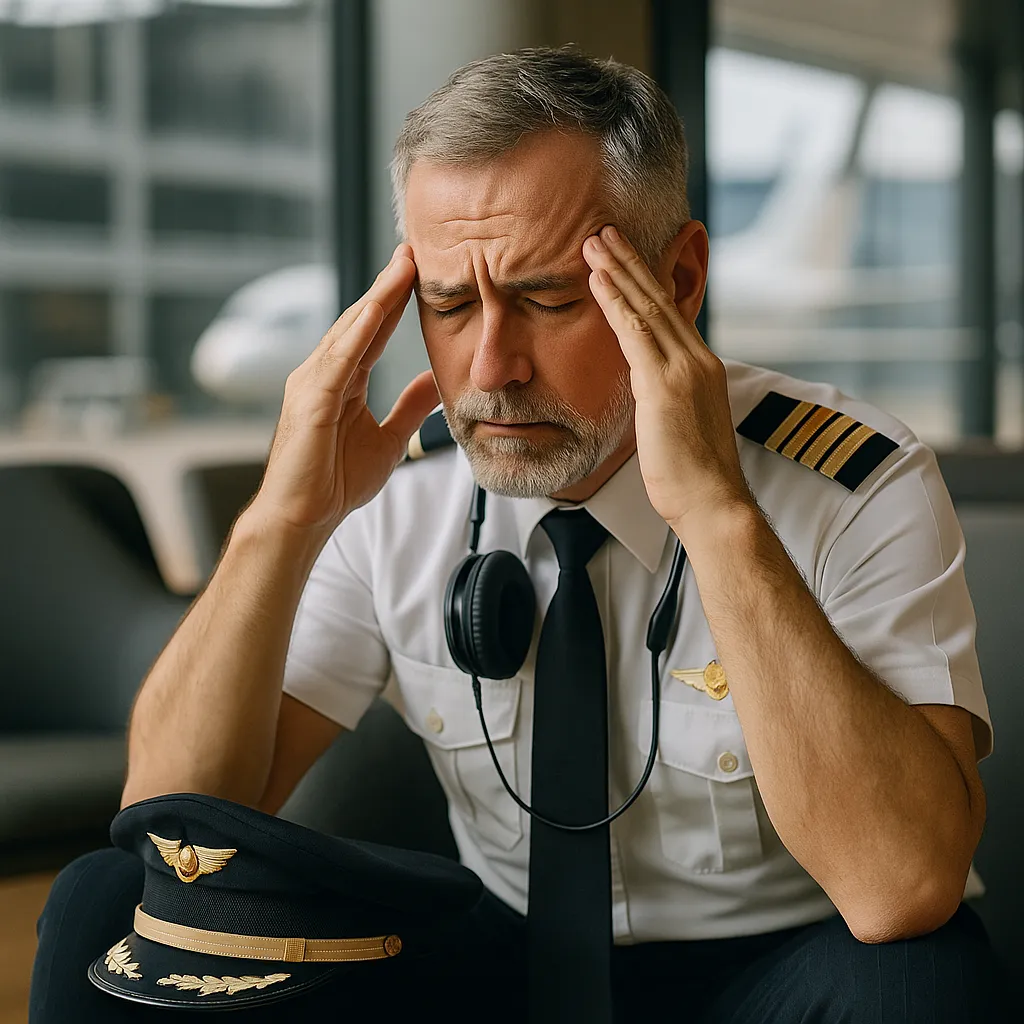Blog

Top Stress Reduction Techniques for Pilots and Crew Members
Effective Stress Reduction Techniques for Aviation Professionals
How Pilots, Flight Crews, and Controllers Can Manage Stress for Safety and Well-Being
Aviation is one of the most mentally and physically demanding industries in the world. Pilots, flight crews, and air traffic controllers are required to maintain laser focus, emotional control, and peak cognitive performance—often in high-stakes environments and under considerable pressure.
Chronic stress in aviation doesn’t just impact individual health; it can affect team coordination, decision-making, and ultimately, flight safety. Fortunately, there are practical, evidence-based stress reduction techniques that aviation professionals can use to stay sharp, grounded, and well.
What Are the Main Causes of Stress in Aviation?
Aviation professionals face a unique combination of stressors, including:
•Irregular schedules and disrupted circadian rhythms
•High responsibility and performance pressure
•Time-critical decision-making in complex environments
•Operational uncertainty (delays, technical issues, reroutes)
•Fatigue, isolation, and limited rest opportunities
•Long stretches away from family or home life
Each role in the aviation ecosystem experiences these pressures differently—but all benefit from structured stress management.
How Do Flight Operations Contribute to Pilot Stress?
For pilots, stress often builds during:
•Pre-flight preparation and checklists
•Communication with air traffic control
•Handling weather or in-flight malfunctions
•Passenger or crew issues midair
•Unforeseen delays or re-routing
The need for calm, rapid decision-making in such moments makes proactive stress reduction essential.
What Stressors Affect Air Traffic Controllers Specifically?
Air traffic controllers operate under intense cognitive and emotional load, juggling:
•Real-time aircraft coordination
•Conflict resolution in limited airspace
•Communication clarity across multiple channels
•Fatigue from long shifts and minimal breaks
•The ever-present risk of error under pressure
Controllers need stress reduction strategies that maintain focus without disrupting task flow.
How Do Flight Crews Experience Unique Stress Challenges?
Flight attendants and cabin crews manage:
•Passenger conflict and emergencies
•Cabin conditions (noise, pressure changes, turbulence)
•Jet lag and inconsistent sleep
•Long hours with minimal movement or privacy
•Constant emotional labor (customer service under stress)
These professionals need practical, portable stress relief tools they can use discreetly and consistently.
Which Relaxation Techniques Are Most Effective for Pilots?
The most effective stress reduction techniques for pilots include:
•Box breathing for instant calm
•Progressive muscle relaxation (PMR) after long flights
•Cognitive restructuring to challenge worry or “what if” thinking
•Visualization before duty to mentally rehearse difficult scenarios
•Mindfulness during cruise or post-flight debriefs
How Can Breathing Exercises Reduce Pilot Stress?
Breathing exercises help regulate the autonomic nervous system, reducing symptoms of acute stress such as:
•Elevated heart rate
•Muscle tension
•Racing thoughts
•Poor judgment or tunnel vision
Try 4-7-8 breathing (inhale for 4 seconds, hold for 7, exhale for 8) before takeoff or during level flight.
What Role Does Mindfulness Play in Pilot Stress Management?
Mindfulness improves:
•Focus during complex operations
•Cognitive flexibility under pressure
•Emotion regulation when things go wrong
•Present-moment awareness to reduce worry or rumination
Pilots can incorporate mindfulness into pre-flight routines, cruise phases, and even while reviewing weather patterns or systems checks.
How Can Cognitive Behavioral Techniques Help Pilots Cope?
CBT techniques help pilots:
•Identify automatic negative thoughts
•Reframe worry-based or catastrophic thinking
•Build new, confidence-based thought scripts
•Develop goal-setting and resilience plans for recurring stressors
These skills are especially useful during flight reviews, check rides, or high-stakes transitions (e.g., changing aircraft types or bases).
How Can Air Traffic Controllers Use Mindfulness to Manage Stress?
Controllers can apply short-form mindfulness practices during shifts:
•Grounding: Focus on one physical sensation (e.g., feet on the floor)
•Box breathing between handoffs
•Brief body scans during slower airspace conditions
•Visual focus exercises to counter fatigue
Mindfulness helps reduce tension without reducing vigilance.
What Are Simple Mindfulness Practices for Controllers During Shifts?
•5-5-5 check: Name 5 things you see, hear, and feel
•Tense-release cycle: Clench and release fists or shoulders
•Micro-breaks: 60 seconds of stillness between sequences
•Attention anchoring: Use a neutral object (pen, headset cord) as a focus tool
These practices can be woven into routine without disrupting workflow.
How Does Mindfulness Improve Focus and Reduce Anxiety?
Research shows mindfulness enhances:
•Selective attention
•Working memory capacity
•Emotional resilience
•Recovery from acute stress
By learning to notice stress signals early, aviation professionals can intervene before anxiety escalates.
Which Mobile Apps Support Mindfulness for Aviation Professionals?
Top-rated mindfulness apps include:
•Calm – meditation, sleep, and relaxation exercises
•Headspace – short meditations with practical themes
•Insight Timer – free access to thousands of guided meditations
•Mindfulness Coach – developed by the VA for high-stress jobs
•Breethe – built-in reminders and breathwork tools
Many apps offer airplane mode features, ideal for use during downtime or layovers.
What Are the Best Stress Relief Exercises for Flight Crews?
•Seated yoga poses or shoulder rolls in the galley
•PMR (Progressive Muscle Relaxation) in hotel rooms
•Gratitude journaling or audio notes post-flight
•Stretching routines to reduce inflammation from long periods standing
•Hydration and nutrition routines to support mood and focus
How Do Progressive Muscle Relaxation Techniques Work for Flight Crews?
PMR involves tensing and releasing muscle groups in sequence, such as:
•Tighten shoulders → release
•Clench fists → release
•Contract calves → release
•Scrunch face → release
This technique reduces residual tension and improves sleep quality after long or turbulent flights.
What Are Quick Stress Relief Methods During Layovers?
•10-minute walk outdoors or in hotel hallways
•Short guided meditation via mobile app
•Journaling or voice memos to decompress
•Breathwork or light stretching
•Connecting with family or peers for emotional grounding
Even short breaks can recalibrate the nervous system and improve recovery.
How Can Sleep Hygiene Improve Flight Crew Stress Levels?
Sleep is often disrupted by:
•Jet lag
•Hotel conditions
•Night flying or early call times
Improve sleep hygiene by:
•Using eye masks or blackout curtains
•Sticking to consistent sleep/wake times, even off duty
•Avoiding caffeine or alcohol before rest
•Incorporating relaxation rituals (e.g., bath, light music)
Good sleep hygiene enhances alertness, cognition, and mood regulation.
What Coping Strategies Support Long-Term Stress Management in Aviation?
•Routine exercise for cardiovascular and mental health
•Therapy or coaching for emotional resilience
•Digital detox periods off-duty
•Time tracking apps to balance rest and workload
•CBT-based journaling or self-check-ins
Sustainable wellness means managing stress before it becomes burnout.
How Does Personalized Coaching Enhance Aviation Stress Resilience?
Working with a certified coach or telehealth counseling helps aviation professionals:
•Identify personal stress triggers
•Create custom stress management plans
•Set actionable wellness goals
•Stay accountable across long or irregular schedules
Coaching is especially helpful for career transitions, promotions, or recovery after high-stress events.
What Role Do Workshops and Webinars Play in Stress Reduction?
Wellness education delivered through airline webinars, industry conferences, or union events:
•Teaches the science of stress
•Introduces techniques like CBT, ACT, or mindfulness
•Provides a shared language for talking about stress
•Reduces stigma by normalizing mental health support
•Interactive sessions offer practical takeaways and community building.
How Can Aviation Professionals Build Preventative Stress Habits?
•Daily or weekly stress “check-in”
•Breathing exercises after duty
•Sleep and hydration tracking
•Scheduled digital breaks
•Rotating stress tools (journaling, apps, walks) to stay engaged
Like flight planning, prevention starts with small consistent habits.
How Does Technology Aid Stress Management for Aviation Professionals?
Technology can:
•Track heart rate, sleep, or stress trends
•Offer real-time breathing guidance
•Deliver personalized meditation or cognitive exercises
•Provide insightful data to share with wellness providers
•Help maintain longitudinal mental health records
Wearables and apps support both real-time intervention and long-term insight.
What Features Should a Stress-Tracking Mobile App Include?
•Mood and symptom tracking
•Integration with sleep and activity data
•Reminders for relaxation or hydration
•Private journaling or voice memo tools
•Optional sharing with a therapist or coach
Aviation pros benefit from apps that work offline and adapt to time zones.
How Do Guided Meditations Support Aviation Mental Health?
Guided meditations provide:
•Structured focus for beginners
•Specific themes (anxiety, sleep, confidence)
•Calming audio for hotel rooms or rest areas
•A way to disconnect and recalibrate before or after flights
Even 5 minutes per day can improve stress resilience.
Which Online Courses Offer Evidence-Based Stress Reduction?
Courses from:
•Coursera (e.g., The Science of Well-Being)
•Mindful.org and UC Berkeley’s Greater Good Science Center
•Airline or union wellness programs
•Aviation mental health organizations offering webinars or on-demand training
Look for programs based on CBT, MBSR (Mindfulness-Based Stress Reduction), or ACT (Acceptance & Commitment Therapy).
Where Can Aviation Professionals Find Reliable Stress Reduction Resources?
•Pilot wellness toolkits from ALPA or EASA
•Online libraries from aviation psychologists
•Mobile apps with peer-reviewed techniques
•YouTube channels from aviation wellness educators
•Creative Commons-licensed materials for personal use
Resources should be evidence-based, adaptable, and confidential.
What Articles and Videos Provide Practical Stress Management Tips?
•Flight Safety Foundation publications
•FAA or ICAO safety bulletins on crew resource management
•Mental health organizations like CAMI (Civil Aerospace Medical Institute)
•Professional aviation psychology blogs and case studies
•Meditation and mindfulness YouTube creators who specialize in high-stress professions
Bookmark trusted sources and share them with your crew.
How Can Aviation Psychologists Support Mental Wellness?
Aviation psychologists are trained to:
•Deliver CBT and stress reduction therapies
•Support pilots or crew navigating medical certification concerns
•Offer guidance after trauma, burnout, or professional setbacks
•Design airline-wide wellness initiatives
They’re also skilled in maintaining confidentiality, cultural sensitivity, and FAA-aligned documentation.
What Are the Benefits of Joining Aviation Well-Being Communities?
•Shared coping strategies and experiences
•Peer accountability and encouragement
•Access to resources and expert Q&As
•Opportunities to reduce stigma and promote a culture of wellness
Examples include airline peer networks, mental health Slack groups, or online pilot wellness forums.
Final Thoughts: Calm Crew, Safe Skies
Stress is a given in aviation—but suffering doesn’t have to be. With simple, proven stress reduction techniques and supportive resources, aviation professionals can stay mentally sharp, emotionally balanced, and professionally resilient.
No matter where you fly or who you fly with, you deserve a toolkit that supports your well-being at every altitude.
For more specialized support, consider exploring therapy for pilots and aviation professionals.

Stephen Rought, LCSW
Proudly Accepting
Aetna and Medicare Insurance


Disclaimer
Stephen Rought, LCSW does not guarantee any specific outcome. All content provided on the Stephen Rought, LCSW website is provided for educational or informational purposes only. Consult medical professionals you are working with about whether any opinions or recommendations provided through this website apply to you and your unique circumstances
Currently, all online therapy sessions are conducted using the HIPPA compliant Telehealth service doxy.me
SErvices
Individual Therapy
Parent Coaching
Financial Therapy
Couples Counseling
Family Therapy
